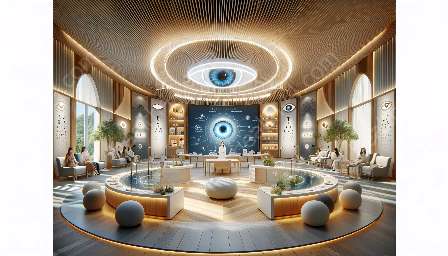Vision development is a critical aspect of childhood growth, affecting learning, behavior, and overall well-being. By understanding the complexities of developmental vision, we can promote eye health education and provide better vision care for all.
The Importance of Developmental Vision
Developmental vision encompasses the physiological and neurological processes that contribute to the ability to see and interpret the visual world. It is a dynamic and continuous process, beginning at birth and extending into early adulthood. During this period, a child's vision undergoes significant changes and refinement, playing a crucial role in their overall development.
From infancy through childhood, the visual system matures and adapts, influencing a child's ability to focus, track objects, perceive depth, and process visual information. This development is closely linked to other areas of growth, including motor skills, language acquisition, and cognitive functions. As a result, any disturbances in developmental vision can have far-reaching implications for a child's learning, behavior, and emotional well-being.
Eye Health Education and Promotion
Education about developmental vision is essential for parents, educators, healthcare professionals, and the general public. By raising awareness about the typical milestones and potential challenges in visual development, we can identify and address vision-related issues at an early stage. Proper eye health education also emphasizes the importance of regular eye examinations, protective eyewear, and healthy visual habits to maintain optimal vision throughout life.
Promoting developmental vision within communities and schools fosters an environment that supports visual wellness. This includes advocating for policies and initiatives that prioritize vision screenings, access to eye care services, and the integration of visual health into overall well-being programs. Encouraging healthy lifestyle choices, such as outdoor activities and reduced screen time, further contributes to the preservation of developmental vision.
Vision Care for Developmental Needs
Providing comprehensive vision care involves recognizing the unique needs of individuals at different developmental stages. Early intervention is crucial for addressing vision problems in infants and young children, as their visual systems are still developing. Pediatric eye care specialists play a vital role in assessing and managing conditions such as amblyopia, strabismus, and refractive errors, which can significantly impact developmental vision.
For school-aged children and adolescents, vision care extends beyond basic eye examinations. It encompasses the identification of visual issues that may affect academic performance, social interactions, and overall well-being. Collaboration between eye care professionals, educators, and parents is necessary to ensure that children receive the appropriate visual support and interventions tailored to their developmental needs.
Understanding Developmental Vision Disorders
Developmental vision disorders encompass a range of conditions that can interfere with typical visual development. These may include visual processing disorders, visual-motor integration difficulties, and binocular vision anomalies. Understanding the nature of these disorders is essential for early detection and intervention to minimize their impact on a child's development.
By addressing developmental vision disorders proactively, we can improve access to specialized care and interventions that optimize visual functioning. Multidisciplinary approaches involving optometrists, ophthalmologists, occupational therapists, and educators contribute to a holistic management of developmental vision disorders, promoting better outcomes for affected individuals.
Empowering Through Knowledge
Empowering individuals with knowledge about developmental vision benefits both children and adults. By fostering an understanding of how vision develops and the potential challenges that may arise, we promote proactive measures to safeguard and enhance visual well-being throughout life. This knowledge empowers individuals to advocate for their own vision care needs and seek professional guidance when necessary.
Furthermore, promoting collaboration and communication among healthcare professionals, educators, and parents fosters an environment where developmental vision is prioritized and integrated into overall health and education initiatives. Through continued education and support, we can create a culture of visual wellness that benefits individuals of all ages.


